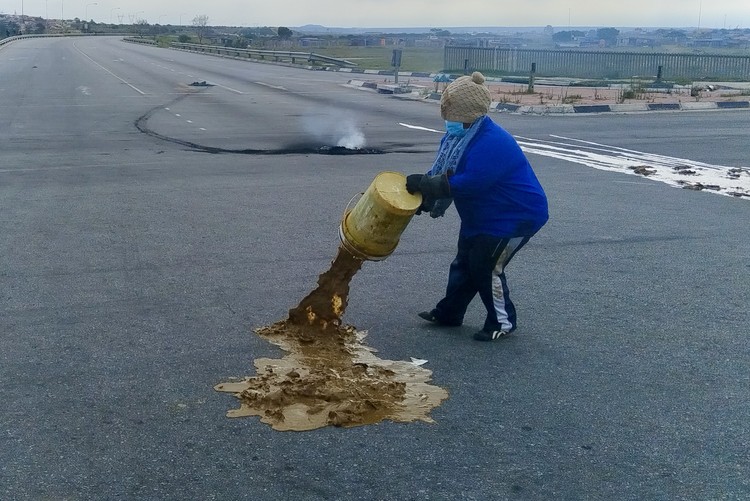31 years into democracy and the bucket system isn’t going away any time soon
The bucket eradication programme, started in 2012, has been through three departments and five implementing agents
A woman empties a bucket of excrement on the Uitenhage Road in Gqeberha in protest. Archive photo: Mkhuseli Sizani
The Nelson Mandela Bay Municipality’s “bucket system” was roundly condemned by community members at an Integrated Development Plan budget review meeting at Xaba Hall in KwaLanga, Kariega on Thursday evening.
The meeting was attended by a panel of ward councillors and municipal officials from various directorates with about 300 residents from formal and informal settlements in wards 45, 50 and 53.
Pastor Arnold Arends from Greenfields in ward 50 said, “For many years, our people have lived with the toilet bucket system. We are 31 years into democracy, yet the bucket system is still in place … Even when new houses are built, the bucket system remains.”
“We are not animals, we are human beings. We have dignity and we deserve to be treated with dignity.”
A report back on the Bucket Eradication Programme at a meeting last month of the Portfolio Committee on Water and Sanitation revealed that eradication of the system in formal areas has been delayed for 12 years by inadequate planning at its inception in 2012, and because projects had moved between three departments and five implementing agents. Departments for human settlements and for water and sanitation have been combined or recreated at various times over the years.
The Department of Water and Sanitation took over from Human Settlements in 2014, and verified over 50,000 buckets to be eradicated in 11 formal settlements in four provinces. This did not include informal settlements, and bucket systems are still being used in informal settlements.
Eradicating the bucket system is “a moving target”, said current water minister Pemmy Majodina.
Water department director-general Dr Sean Phillips said that even if the eradication programmes were completed, “buckets will not have been eradicated in SA”.
According to the department most of its eradication projects are set to complete in December 2024, and the remainder by March 2026.
However, delays persist due to issues such high-water tables and contractual disputes, and flush toilets being installed but without the necessary bulk wastewater infrastructure in place.
The department’s deputy director general Risimati Mathye said they were grappling with “complex engineering assessments and designs” to deal with the reality on the ground, essentially working backwards to supply the infrastructure.
Support independent journalism
Donate using Payfast

Next: People found chained at a private care centre
Previous: SASSA recovers R150-million in ineligible grants payments
© 2024 GroundUp. This article is licensed under a Creative Commons Attribution-NoDerivatives 4.0 International License.
You may republish this article, so long as you credit the authors and GroundUp, and do not change the text. Please include a link back to the original article.
We put an invisible pixel in the article so that we can count traffic to republishers. All analytics tools are solely on our servers. We do not give our logs to any third party. Logs are deleted after two weeks. We do not use any IP address identifying information except to count regional traffic. We are solely interested in counting hits, not tracking users. If you republish, please do not delete the invisible pixel.

